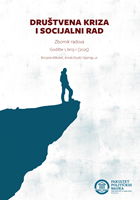KVALITET ŽIVOTA OSOBA S INVALIDITETOM U TEORIJSKIM POSTAVKAMA I EMPIRIJSKIM ISTRAŽIVANJIMA
QUALITY OF LIFE OF PERSONS WITH DISABILITIES IN THEORETICAL SETTINGS AND EMPIRICAL RESEARCH
Author(s): Vasva SmajlovićSubject(s): Social Theory, Health and medicine and law, Welfare services
Published by: Fakultet političkih nauka - Univerzitet u Sarajevu
Keywords: quality of life; persons with disabilities; satisfaction; social support; domains of quality of life;
Summary/Abstract: The relationship between quality of life and disability reveals a cause-and-effect connection, wherein the disability affecting an individual significantly determines their quality of life. In this context, quality of life is influenced by both subjective and objective indicators, with its complexity further shaped by historical developments. Notably, persons with disabilities have historically been subjected to various forms of societal behavior and rejection, ranging from abuse, stigmatization, and discrimination to more progressive approaches. Contemporary perspectives are marked by the social model, transitioning towards a human rights model since the adoption of the Convention on the Rights of Persons with Disabilities. This paper presents various theoretical concepts of quality of life and measurement instruments derived from these concepts. Additionally, through different theoretical approaches, the paper examines societal attitudes towards persons with disabilities, emphasizing the need for change and underscoring the importance of providing social support as a crucial factor for improving their quality of life.
Journal: Društvena kriza i socijalni rad
- Issue Year: 1/2025
- Issue No: 1
- Page Range: 303-330
- Page Count: 28
- Language: Bosnian

